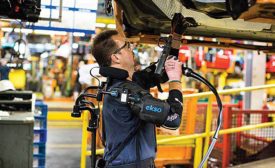Home » Ford Motor Co.
Articles Tagged with ''Ford Motor Co.''
2018 Assembly Plant of the Year: Ford Shifts Flexible Assembly Into High Gear
The Van Dyke transmission plant excels at high-volume, high-mix production.
October 2, 2018
Exoskeletons Lend a Lift at Ford
New technology makes overhead tasks less stressful on operators.
March 2, 2018
Never miss the latest news and trends driving the manufacturing industry
Stay in the know on the latest assembly trends.
JOIN TODAY!Copyright ©2025. All Rights Reserved BNP Media.
Design, CMS, Hosting & Web Development :: ePublishing







